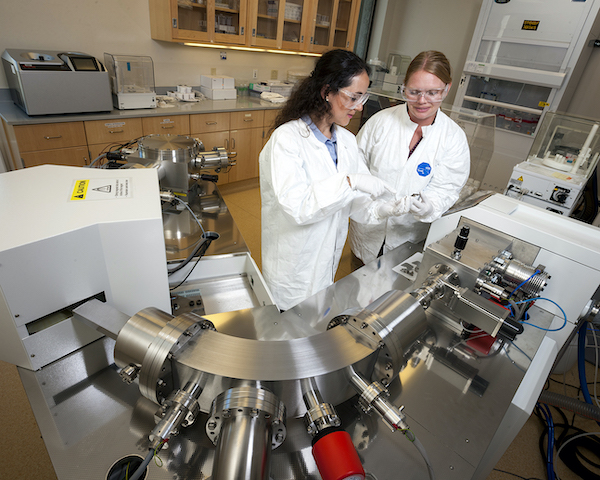News
International Technical Working Group 25th Anniversary Meeting
On June 20-24, nuclear forensics scientists from around the globe came to meet together in Livermore and Pleasanton – for the 25th anniversary meeting of the Nuclear Forensics International Technical Working Group (ITWG). Twenty-seven years ago, in 1995, the ITWG was founded during an organizational meeting at Lawrence Livermore National Laboratory. For the past 24 years from 1996 through 2019, the group met in Europe. About 70 nuclear forensics scientists from 22 nations and 2 international organizations attended the week-long conference, which kicked off Monday with an evening reception, followed by three days of meetings and a tour of LLNL facilities. “The ITWG-25 Organizing Team overcame multiple obstacles over a two-year period to successfully host the 25th anniversary meeting of the Nuclear Forensics International Technical Working Group (ITWG), the COVID-19 pandemic being the largest obstacle of course,” said LLNL’s Mike Kristo, the technical host for the meeting and the leader of the Lab’s Chemical and Isotopic Signatures Group. After a fully virtual meeting last year, this anniversary event was abuzz with energy, as the membership was able to gather in person for the first time in three years. The ITWG has honored its ongoing commitment to the G-7 to keep the organization technical, and to keep it informal, a commitment that was enabled in this instance by strong organization and execution of the conference by the ITWG-25 Organizing Team and the ITWG leadership, as well as everyone in attendance,” Kristo added.This year’s conference featured a number of technical talks, two professional development seminars and meetings of the ITWG’s five task groups.
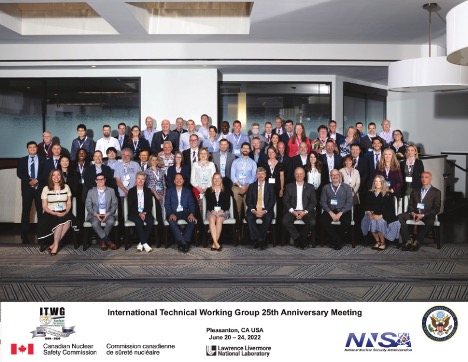
Jordan ADP Meeting
The NSDD Investigation Support Team conducted, for the first time since the pandemic, an in-person Analytical Plan Development (APD) Workshop in Nuclear Forensics, on 29 May – 31 May 2022 in Amman, Jordan. The workshop was led by nuclear forensics experts from Lawrence Livermore National Laboratory (LLNL), together with Los Alamos National Laboratory (LANL). This APD Workshop was conducted to support the advancement of a nuclear forensics capability, following the virtual scoping meeting that was held with Jordan in August 2021. The workshop was held at the Energy & Minerals Regulatory Commission (ERMC) in Amman over the course of three days, followed by laboratory visits to the EMRC, the Jordan Atomic Energy Commission (JAEC), and the Public Security Directorate (PSD) on June 1. A total of 28 laboratory scientists and team leaders from the EMRC, JAEC, PSD, and National Center for Nuclear & Radiological Security in Jordan participated.
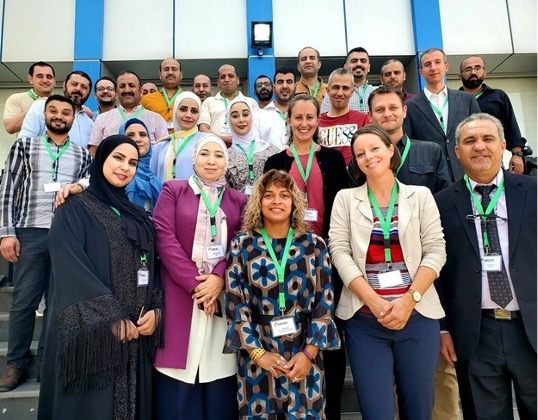
IAEA Technical Meeting on Nuclear Forensics: From National Foundations to Global Impact, Vienna, Austria:
On April 11-14, the IAEA convened Technical Meeting on Nuclear Forensics in Vienna: Attended by over 140 participants (~100 in-person + 40 virtual) from 35 countries and brought together key stakeholders from scientific, technical, law enforcement and prosecutor communities. Several LLNL staff members played key roles in the planning and execution of the Technical Meeting: Frank Wong, Naomi Marks, Ruth Kips (Technical Meeting co-chair), and David Smith (retired). The meeting used a common scenario to weave a compelling sequence of crime scene, forensic analyses, and court room proceedings to reinforce for participants how radiological crime scene management methods and nuclear forensic conclusions are used in judicial proceedings –They reveal links among people, places, events, and materials.
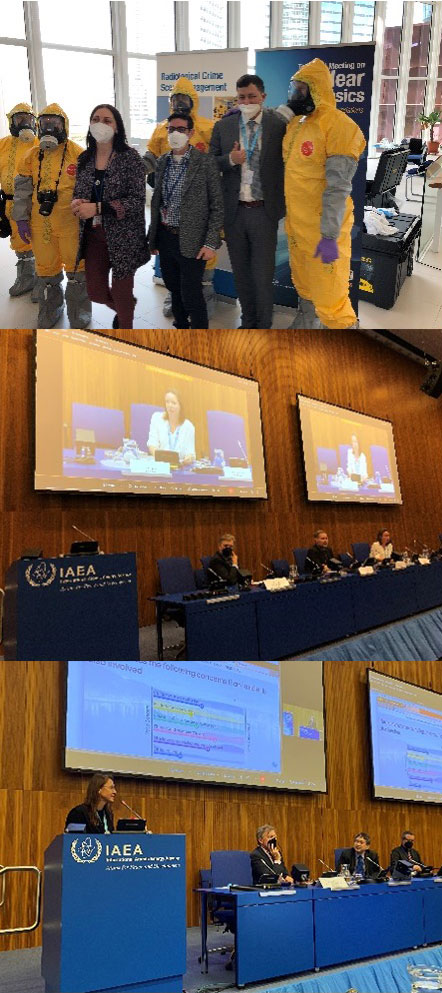
2021 Analytical Plan Development goes virtual!
On April 20-22, Lawrence Livermore National Laboratory hosted the pilot virtual workshop on Analytical Plan Development in Support of Investigations with the National Institute for Health and the Environment (RIVM) in the Netherlands, together with nuclear forensics experts from Los Alamos National Laboratory (LANL) and an event coordinator from Pacific Northwest National Laboratory (PNNL). The event aimed to advance the understanding of technical experts on the laboratory’s role in supporting an on-going law enforcement investigation of radioactive or nuclear (R/N) material found outside of regulatory control. The workshop was centered around a scenario-based policy discussion and used tools such as MentiMeter polling, break-out group discussions and a web interface (accessible through this website, but password protected) to encourage discussion among participants.
The Netherlands is a new partner country for NSDD Investigation Support, and this workshop served as a starting point of a collaboration with RIVM and other stakeholders. The workshop was also attended by observers from the Netherlands Forensic Institute (NFI) and the Belgian Federal Agency for Nuclear Control (FANC).
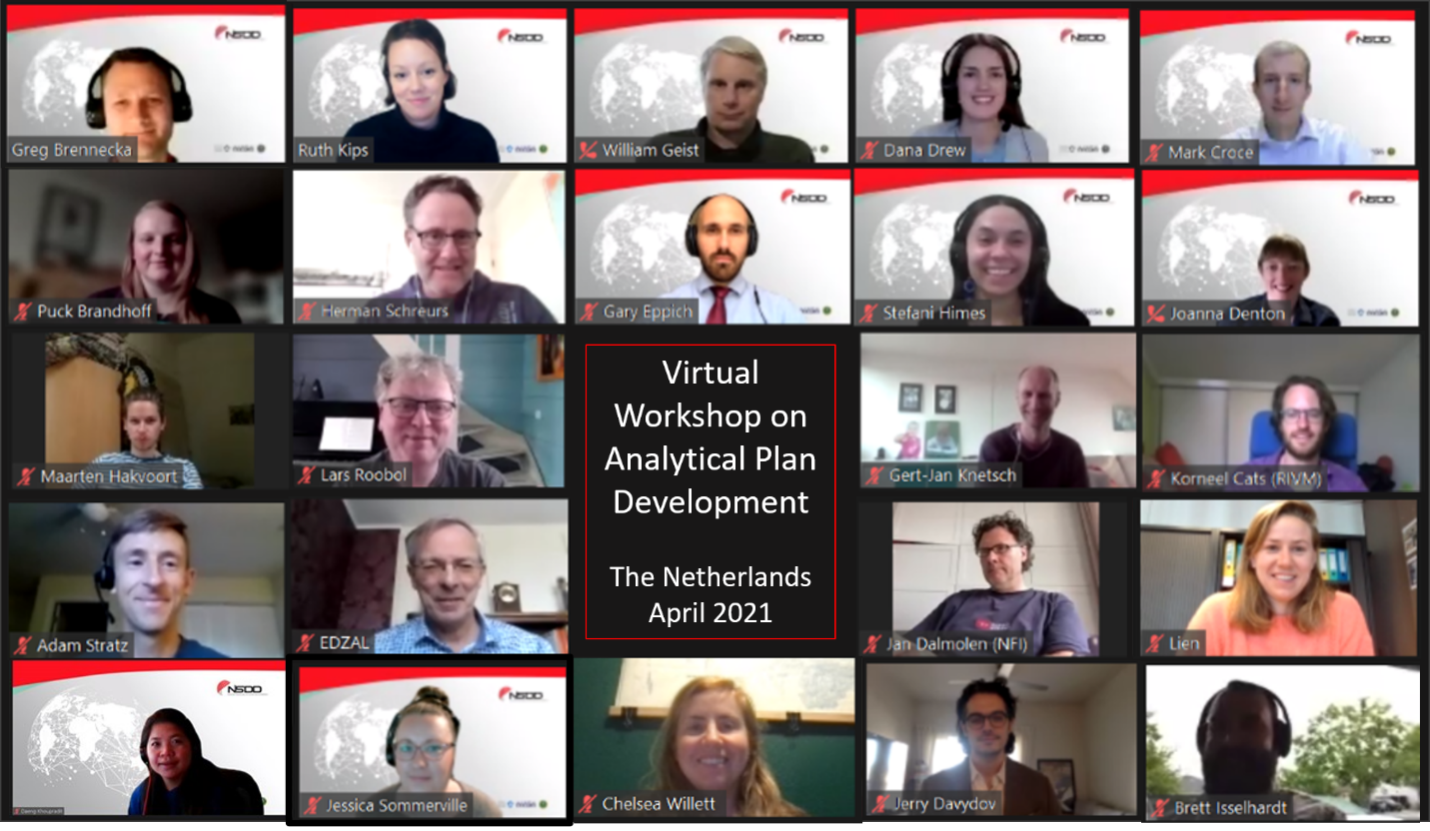
Virtual Lab on Age-Dating (VLADIS)
On October 22, 2020, the first meeting of the Virtual Laboratory on Age-dating for Investigation Support (VLADIS) was held through Webex with close to 20 participants from LLNL, LANL and the Australian Nuclear Science Technology Organisation (ANSTO). VLADIS is a newly-launched initiative to connect practitioners on radiochronometry in a virtual setting. This initiative began out of LLNL/LANL’s successful and long-running age-dating collaboration with colleagues at ANSTO through DOE’s Office of Nuclear Smuggling Detection and Deterrence (NSDD). With travel restricted, VLADIS aims to create a platform where age-dating practitioners can learn from one another using web-based platforms to give presentations, share questions about radiochronometry, and build a network of practicing analysts.
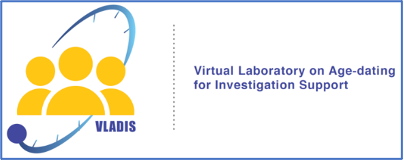
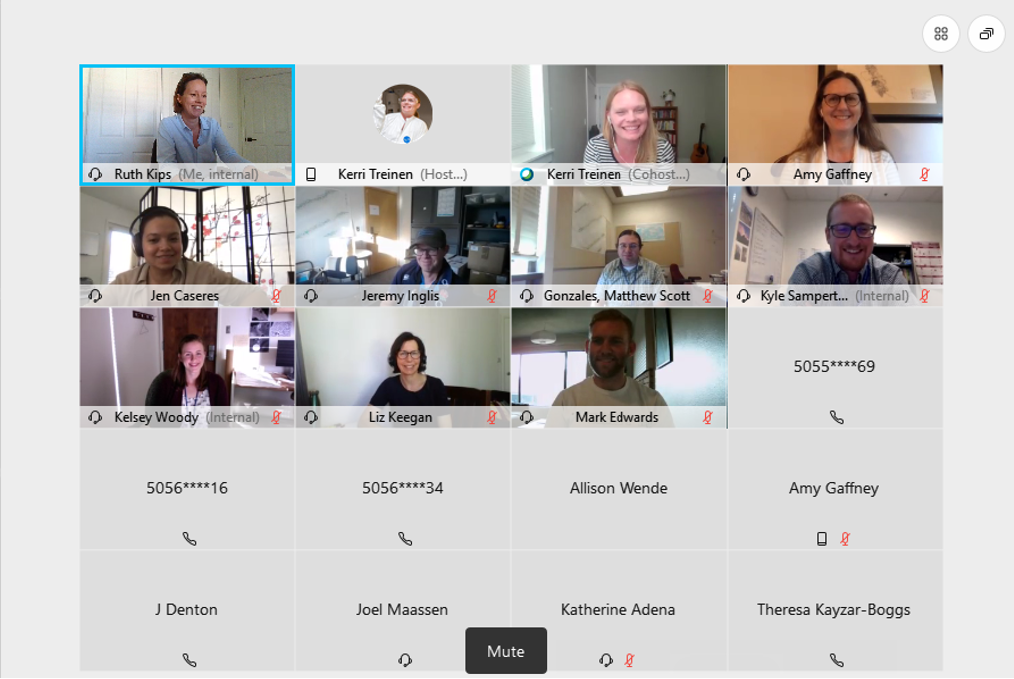
IAEA International Conference on Nuclear Security 2020
Held on 10-14 February 2020 in Vienna, Austria, this international conference is convened approximately every three years and also includes a Ministerial Segment (usually the first 1.5 days).
This conference also included one day that was mostly devoted to nuclear forensics (13 February 2020). A set of selected presentations on nuclear forensics from 13 February 2020 can be found below.
Joint UOC analysis
The Institute of Nuclear Physics (INP) in Almaty, Kazakhstan, hosted a data review meeting on 15-17 October 2019 to discuss the outcomes of the recent nuclear forensics joint sample analysis between INP, the Japan Atomic Energy Agency (JAEA), the Hungarian Academy of Sciences (MTA-EK) and Lawrence Livermore National Laboratory (LLNL). The objective of the joint sample analysis was for the participating laboratories to 1) exercise their nuclear forensics capabilities by analyzing a set of uranium ore concentrates (UOC) according to a nuclear forensics analytical plan developed by each participating laboratory, and 2) determine whether an additional “blind” sample was similar to any of the other UOC samples in the set. During this 2.5-day meeting with close to 30 participants, the four laboratories described their analyses and presented their findings, which largely agreed with each other. Due to the success of the exercise, the nuclear forensics group at INP will use the outcomes and results of the joint sample analysis for a new scenario-based table-top exercise as part of the upcoming IAEA regional nuclear forensics workshop that will be held at INP in December 2019. The results of the exercise will also be presented at the IAEA’s International Conference on Nuclear Security (ICONS) in February 2020 at IAEA Headquarters in Vienna, and a joint publication is in preparation. The data review meetings were held at INP’s Nuclear Security Training Center (NSTC) and were concluded with lab tours of INP’s nuclear forensics laboratories, as well as a visit to the VVR-K reactor and medical isotope production facility. Representatives from the Committee of Atomic and Energy Supervision and Control of the Ministry of Energy (CAESC), the National Nuclear Center Kurchatov (NNC), the Institute of High Technology (IHT) and Kazatomprom were invited as observers to the meeting.
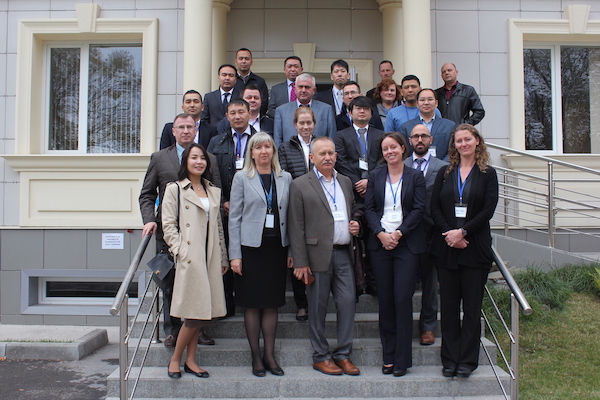
GICNT Plenary Meeting
Over 190 participants from 55 partner nations and five official international Observer Organizations of the Global Initiative to Combat Nuclear Terrorism (GICNT) gathered in Buenos Aires, Argentina, June 5-7, 2019, for the initiative’s 11th high-level Plenary Meeting. http://www. gicnt.org/statements/2019-Plenary.html
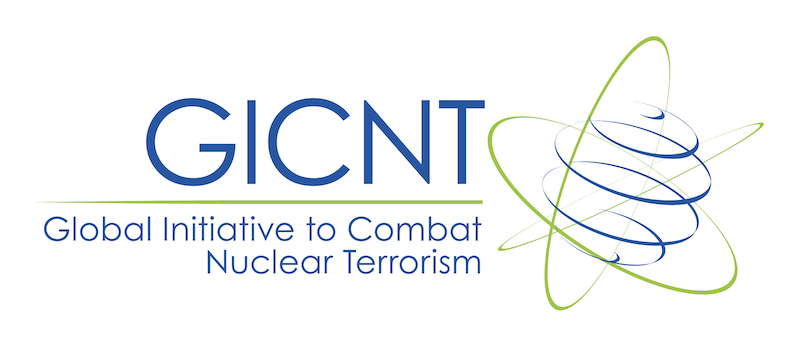
IAEA Technical Meeting on Nuclear Forensics
The International Atomic Energy Agency (IAEA) hosted the Technical Meeting on Nuclear Forensics: Beyond the Science at IAEA HQ in Vienna, Austria 1-4 April 2019. Over 150 participants from 80 Member States, INTERPOL and the European Commission participated in the various sessions and panel discussions. The Technical Meeting highlighted ongoing international efforts to provide forensics training and assistance, identify best practices, and implement nuclear forensics capabilities to assist in establishing links among people, places, events and materials. Participants exchanged experiences involving the successful development of national nuclear forensic programs and developed a vision for a stronger integration of nuclear forensic capabilities within national nuclear security regimes. The Technical Meeting also showcased commitments made by Member States per IAEA Information Circular 917 (INFCIRC 917), “Forensics in Nuclear Security” to ensure robust and enduring nuclear forensics capabilities. The Director of the IAEA Division of Nuclear Security, Raja Adnan, called the meeting a big success and indicated he would like to showcase the key themes of the Technical Meeting on nuclear forensics at the upcoming IAEA International Conference on Nuclear Security (ICONS) in February 2020. More information on the April IAEA Technical Meeting can be found here.
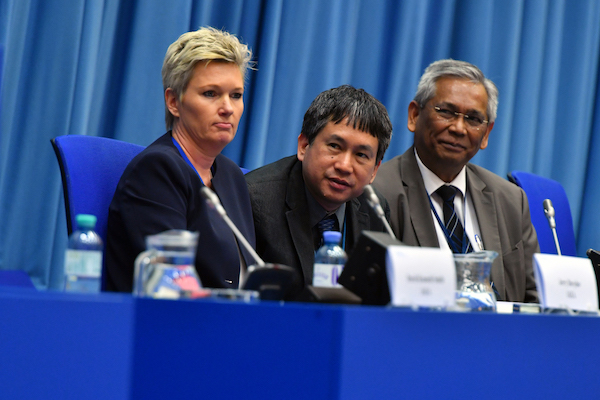
Morocco National Nuclear Forensics Library Workshop
Argonne National Laboratory (ANL) and Lawrence Livermore National Laboratory (LLNL) co-facilitated a workshop on National Nuclear Forensics Libraries (NNFL) in Rabat, Morocco during the week of 14 January 2019. The workshop included 23 participants from several different organizations and focused on coordinating the resources and stakeholders necessary to develop Morocco's NNFL. Participants enthusiastically participated in the various tabletop exercises, discussion-based activities and experiential exercises with simulated radioactive sources.
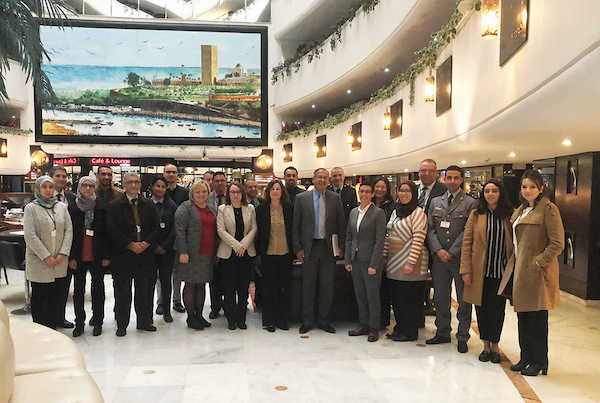
IAEA Residential Assignment
LLNL is the first U.S. National Laboratory to host the International Atomic Energy Agency (IAEA) Residential Laboratory Assignment for Human Capacity Building in Nuclear Forensic Measurements. For this IAEA capstone activity, Marta Bavio, a mass spectrometrist from the National Atomic Energy Commission (CNEA) in Argentina, was selected for a 63-day (Sept-Nov) mentorship at LLNL. The goal of the assignment was to enhance the skills and confidence of the resident scientist in support of a comprehensive nuclear forensic examination. The IAEA’s Division of Nuclear Security partnered with the U.S. Department of Energy’s National Nuclear Security Administration (DOE/NNSA) Office of Nuclear Smuggling Detection and Deterrence (NSDD) to sponsor this IAEA Residential Assignment. Argentina has almost 70 years of experience in nuclear technology research and development of nuclear energy for peaceful purposes. With proper analytical techniques and training in nuclear forensic methodologies, it will be capable to answer the questions from law enforcement authorities in the event of a nuclear security incident. A joint LLNL-CNEA-IAEA abstract will be presented at the IAEA Nuclear Forensics Technical Meeting in Vienna in April 2019. The Residential Assignment was considered to be highly successful by all parties involved. Previous IAEA Residential Assignments were hosted by Hungary and the European Commission’s Joint Research Centre (EC-JRC).
